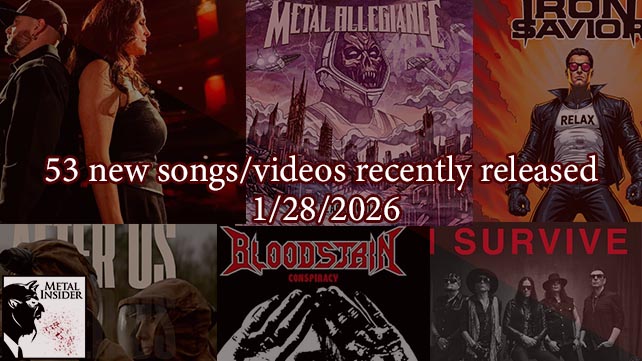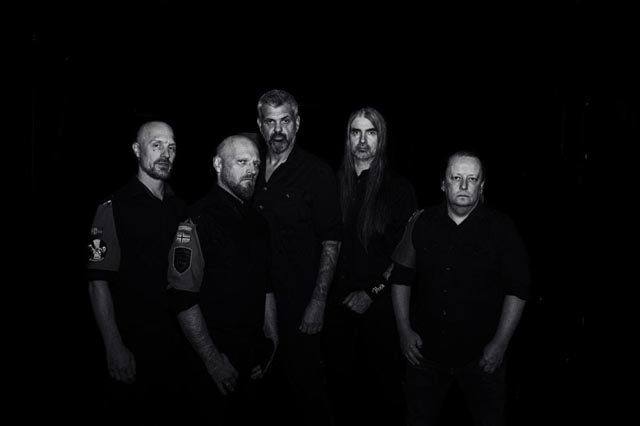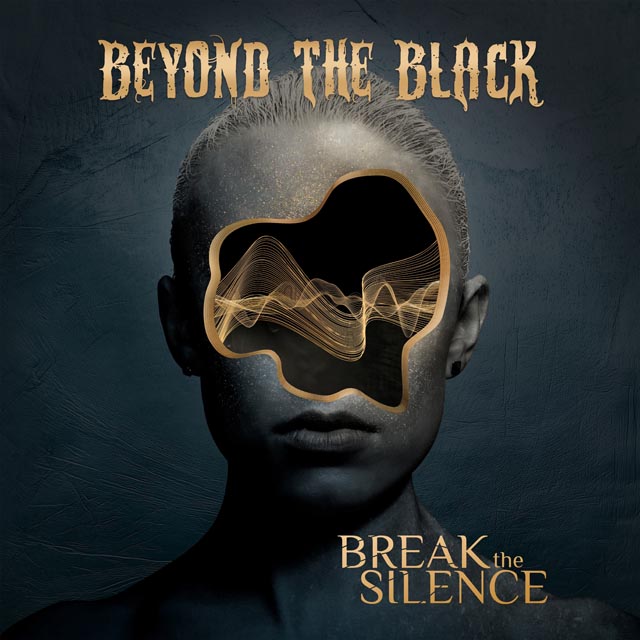This coming Tuesday (7), West Virginia’s Byzantine will be releasing their fifth album, To Release is To Resolve. Several months ago, Metal Insider contributor Schuler Benson caught up with the band in the studio as they wrapped up production on the album to talk about what went into making it, crowdfunding, and the new interest that the band has gotten in the past few years. .
In Jay Hannon’s 7over8 Studios, I’ve just heard a couple rough mixes from Byzantine’s forthcoming fifth album, To Release Is To Resolve, when the band’s singer and guitarist, Chris “OJ” Ojeda,, sits down across from me for our interview. He’s got a Sam Adams beer in one hand, and a homemade chocolate-chip cookie in the other. Pretty apt combination, as dark beer and dessert are, in a lot of ways, a fitting parallel for Byzantine’s music; it’s stout and it’s sweet, it burns going down, and too much of it will fuck you up.
Byzantine’s first three albums were released in the most frantic stretch of what was being called “The New Wave of American Heavy Metal,” which may or may not still be a thing. The band’s sound was at once familiar and unique, as well as instantly recognizable. Staccato beats and riffs in lock-step punctuated jazz-infused, off-kilter time signatures that could turn on a dime, leading into some of the most refreshing multi-layered acoustic harmonies this side of two guitars and a campfire. And soaring over (or railing against) all of it was OJ’s truly schizophrenic vocal delivery. The guy’s style was anathema, with sometimes not even a whole measure of music between Halford-style clean howlers and the kind of migraine-inducing screams that keep Chloraseptic on store shelves. Following the monotony of ‘90’s commercial metal, a lot of bands’ biggest selling points were their ability to transcend genre, to embrace a handful of different styles, and meld those styles into a magnetic combination of vitriol and catharsis. And Byzantine delivered in spades, releasing three slabs of a burly, metallic amalgamation crafted with deft musicianship and technical prowess. But, like a lot of promising metal acts, the financial realities of a failing industry took enough of a toll on the band that they called it quits the day after the release of their masterful third album,2008’s Oblivion Beckons.
After a four year break, the band reassembled to crowdfund a fourth, self-titled album, and soon found a level of appreciation they were unable to attain as a signed band in the previous decade. Byzantine captured the melodic trippiness of Oblivion Beckons’ most experimental moments, and fused it with an even more immediate muscularity than what the band displayed on their much-lauded second record, …And They Shall Take Up Serpents. The songs sounded so fresh, so renewed, and it was truly exciting to see a band with that much history be not only still on fire for the music that inspired them, but also willing to take risks and expand their repertoire on tracks like “Posthumous,” one of the most pensive, introspective songs in their catalog.
I’ve been a fan of the band since their first album, The Fundamental Component. After hearing the progression of material on the upcoming To Release Is To Resolve, and after being present while OJ laid down some vocal tracks, man… the fire’s still there. The dude sounds fantastic. In a small room with a microphone, making notes on a lyric sheet in front of him, the intense, off-the-rails pitched screams that erupt from this dude sound exactly like what you hear on a Byzantine release, and given what seems to be the universal presence of digital alteration in most recording studios, the gap between how I expected raw vocals to sound and how a mastered Byzantine album sounds was basically nonexistent. And as rowdy as OJ’s vocals are, it’s clear they’re tailored to mesh with the instrumentation of the new songs. The tracks I heard ran a wide gamut of styles; there’s a lot of galloping, “Nadir”-style momentum. There’s some bluesy, Southern-inspired fretwork that almost sounds like Clutch at times, but with more swagger and infinitely more heaviness, a la “Hatfield” meets “Five Faces of Madness.” Some passages feel loose and improvisational, displaying a band that’s clearly having fun while showcasing a seasoned confidence. These fun, even tender, moments don’t feel the least bit contrived, even when contrasted against the mechanical, sledgehammer riffing and percussion that’s almost always sure to follow any lull. But it’s when these songs funnel into what seems to be their most straight-forward passages that the band’s sound starts to belie its skill; they’ve been doing this shit long enough that they’re making it look easy. If you have ever liked this band, you’re gonna wanna hear this record.
After previewing the new stuff, I sat down with OJ and his engineer (and Gizmachi guitarist), Jay Hannon, to talk about Byzantine’s past, the crowdfunding phenomenon, the recording process of To Release Is To Resolve, and how awesome it is that music has the power to reduce three grown men with families, mortgages, car payments, and real-world responsibilities into 15-year-old kids who believe there’s nothing in the world more genuine than the crunch of distorted guitar.
You’ve mentioned on Facebook and in the PledgeMusic bio that you feel like you’ve got a lot to prove on this album. Looking back at progression over the last four records, what’s your vision for To Release Is To Resolve? You guys have covered so much ground, what are the frontiers now? Where’s left to go?
The main thing I set out to do with writing this one was, basically, to not drop the ball from the last album, because I was so happy with how the last album turned out, production-wise and song-wise. Especially coming off a five or six year layoff of not writing new music. So what I really wanted to do was keep that same level, that same kind of progress. And then when we lost two band members, you know, I knew that was gonna be very hard to do.
Right. There are some lineup changes for this one.
After we recorded the last album, we played a few shows out around our area. We knew we weren’t gonna be doing much touring, and we didn’t get a booking agent, so we were doing regional shows, just to keep the name out there. About six months after the last album came out, our bass player, Skip Cromer, who joined us on the second album, informed us he’d had a change of heart. He wasn’t feelin’ playin’ heavy metal anymore. And, man, that broke my heart. And it was abrupt. So we started looking for another bassist, and found Sean Sydnor, who’s with us now. After Sean joined, Tony [Rohrbough, lead guitarist and founding member]… Tony just wasn’t happy with being in the band at that time. That’s the simplest way to put it.
Jay Hannon: The most diplomatic way to put it. [laughs]
OJ:Yeah. The magic was gone for him, y’know? He came to me and [drummer, Matt] Wolfe and said maybe we should think about ending it. Again. And me and Wolfe, man… we weren’t havin’ it. We had to let Tony go, and it… was really rough. He started the band with me and he wrote a good bit of the music with me. So after that, we went and grabbed Brian Henderson, who’s our new guitar player. He’d filled in for Tony a few times before, and we knew that if there was a chance to keep Hendo in the band, we’d do it. So he was really the logical choice for us. And, man, he’s turned out to be a fantastic band member. We’ve got a new lease on life with these guys.
JH: Big shoes to fill though.
For sure. Tony’s an incredible player.
OJ: He really is. And I was a fan of his before we started the band. He’s a player, and he knows a lot about theory. So, yeah, bringing Hendo in after Tony, those were big shoes to fill. But, moving forward, once I’d demoed all the material for this new album, and those other guys came in and started adding to it, it really started to come together and become a Byzantine record. Sean plays with his fingers, and that’s a style we’ve not had before. It sounds amazing. He’s got so much attack, it sounds like he’s playing with a pick. And Brian, as a guitar player and as a soloist, his blues background, it’s really shining through in what he’s doing on these new songs. It’s adding a whole new ripple to us, to what we’re doing. It’s a breath of fresh air to get this far into recording and not be like, ‘oh, fuck, this doesn’t feel right,’ y’know?
For sure. And just being in here tonight, hearing this and watching you, it’s clear you’re having fun, man.
OJ: I am, man. I’m havin’ fun. Like, I’m gonna turn 40 in two weeks, and I’m more amped about being in this band and about playing heavy metal than I was when I was 30. Feeling this way at this age, man… it’s a revelation. I had a timeframe on it when I was younger, and me hitting 40 was way past that time frame. I didn’t think there’d be a fourth album, a fifth album. But being here now, man, it’s crazy, because I’m thinking, like, ‘Shit! These two may be our best albums.’
Then let’s talk about To Release Is To Resolve’s place in Byzantine’s catalog. In the past, you’ve covered a lot of themes lyrically. Natural history, political history, more personal issues like addiction, and then some out-there, sci-fi type stuff. One of the things I think is interesting is that, regardless of how pointed the topics may be, there’s still an ambiguity to Byzantine lyrics that lets listeners take these songs, and kinda make them their own.
OJ: Man, I’m glad you picked up on that. There have been times in the past where I’ve thought maybe I’m writing stuff that’s too pointed. Like, I don’t wanna preach to anyone. I wanna get my point across and talk about what I wanna talk about, but I still want people to be able to find their own meaning in there, too. So the ambiguity, it’s intended, but without trying to be too aloof. Without, like, throwing words together with no meaning.
JH: Not like, ‘hey, this dude owns a thesaurus. Congratulations.’
OJ: Right? I mean, I work hard on the lyrics. In the past, the formula I’ve always used was I wrote the music completely separately from the lyrics. I’d write the music and have it pretty much done, then I’d go and jot down ideas on the side as I was listening to the music. Then as I’m listening to it, if it’s got the right feel to it, then I’ll put in words that I feel like go with the music. It’s like strands of DNA. There’s a new song, “The Justinian Code,” where the music felt like it had a Middle-Eastern feel, in that scale, and so then I put down some words that paired well with it. As far as other topics, I mean… I’ve been writing for a long time, so there’s a lot of I’ve written about before that I’m coming back around and revisiting again. Like with what we worked on tonight, those lyrics, there’s the theme of drug addiction problems, issues back home, like… I could write ten songs about that, y’know? There’s a song on this album about the West Memphis 3, something that’s always been very important to me, that I’ve spent a lot of time reading about. “Justinian Code” has some ties with the Byzantine empire, ancient history, then ties in with some of what’s going on in the Middle East right now. So then, I take that stuff and try and make it so metalheads can read it, and shout the shit while they’re listening to it. [laughs]
Tell me a little bit about crowdfunding. Going back to the self-titled record in 2012, there was starting to be a lot of buzz about crowdfunding platforms, and I think the way you guys ran the Kickstarter fund for the last album was great. It was transparent, it was honest, and the goal seemed like a reasonable, attainable number. A lot of milestones have been hit since then, with unsigned heavier bands racking up, like, over three-hundred grand. Just crazy amounts of money. And since earlier in 2014, Byzantine’s been raising money for a fifth record using PledgeMusic instead of Kickstarter. Tell me about your experience with crowdfunding, why you switched platforms, and whether or not you think Byzantine’s future is gonna be locked in to making records this way.
OJ: I can tell you this, man, it’s a lot of sleepless nights because it puts all the manufacturing, the marketing, everything on the band members. So if you’re not ready to stay up a couple weeks and handle all this, it can drive you insane. It was crazy with this last album, man, having to fulfill all that stuff, put out the album in a timely fashion, then have all this merch in my basement and make sure everybody who bought in gets all their stuff, and that I don’t go broke, because setting up the tiers, at least for the last album, was complicated.
How do you mean?
OJ: Well, there’s a lot you’ve gotta calculate beforehand when you’re setting up the different tiers. You’ll add in numbers for things like shipping, and then the time comes when you’ve gotta ship the product, and it’s like, ‘Well, shit, I didn’t expect this many people from Iceland to pre-order a bundle.’ [laughs] Or Brazil, or whatever. Which is awesome! But, then, when you calculated, say, $15 for shipping and it turns out to be double that to ship a bundle, what are you gonna do then? You can’t go back to ‘em and be like, ‘hey, it’s gonna be $30 to ship,’ I mean, I wouldn’t do that. So it’s coming out of my pocket.
So you went in the hole with the last album?
OJ: We definitely didn’t raise enough beforehand to cover the expenses for the last album. But we covered enough to make it worthwhile. If we would’ve gone and taken a loan from a record company, it would’ve been totally different. Basically a record company is a bank. They loan your band money, and that loan money is recoupable through album sales. If we’d done that, we’d still be unrecouped right now. We raised $8,000 for the last album. The total expense was around $13, $14,000. So it was around six grand we were in the hole. And, man, it took us a month after the album came out to recoup that. A month! And we were in the black, and I was like, ‘holy shit!’ I have three albums on a record label that we’re still unrecouped years after the fact. Years! And I’m in the black a month after putting out my own album? [laughs] How’d this happen?
Dude, that’s a wild turnaround. So why ever go back, right?
OJ: Exactly! And that was what we thought, too. I talked to the band, and we thought, y’know, in regard to a label, no matter what the offer is, if we were to get one in the future, within reason, no matter what the offer is, I’m never signing another record deal again. It’s smarter this way. I own my own business back home, and while we were taking a break from playing music, I learned some business practices that made me better at this side of being in the band, the business side. At this phase in Byzantine’s career, I feel like I’m able to make smarter moves.
Very different from a label experience?
OJ: Man, yeah. Because, look… at the end of the day now, if there’s a problem with anything, any aspect of it, I know exactly where to look: at me. At myself. Because it’s all on us now. I don’t have to email someone to email someone to call somebody to get back to me about something, some aspect of the band that I wouldn’t have handled back in the label days. If there’s a problem with anything, man, they just come to me. Someone had a problem on the last album with a shirt they ordered. Said it was too small, they got in touch with me directly on Facebook, and I was able to make it right, like, right then. Didn’t have to call or email anybody, it was all on me. So there’s tons of upsides. The only downsides are how much is on you, as far as working with aspects of it, business aspects, that as a musician, you might not have known that much about before you had to do it all yourself.
JH: Well, and there’s people, there’s fans out there that still don’t get why it works the way it does. Friends of mine, they’ll send me texts with pictures in ‘em of, like, Liquid Metal playing “Signal Path” by Byzantine, and they’ll be like, ‘man, how the fuck are these guys not signed?’ And years ago, that was what everyone wanted. But it’s easier now for some bands to do what they love and make a few dollars and not even have a label involved.
OJ: And talkin’ about radio, that’s another thing that’s on us now. When we’re looking at what songs to try and release as singles, people, like businessmen at labels, look at song length, they look at how heavy it is or isn’t, and there’s stuff that would’ve gone into choosing which songs to send to radio that we, as a band, might not think is the most important.
‘Let’s release ‘Pathogen’ to radio, it’s the only song on the record under four minutes.’
OJ: [laughs] Exactly! We’re responsible for those aspects of it now. With the band member wearing so many hats, I think those aspects that, with a label, would’ve had a lot more to do with business, those aspects get more love from us, because it’s what we created, it’s what we really love, so we get to put that kind of care into those kind of choices.
So why switch from Kickstarter to PledgeMusic for this album?
OJ: There are some differences, man. It’s kinda like Chevy and Ford. They run stuff a little different. Kickstarter’s got a bigger name, but PledgeMusic’s been doing it longer. Kickstarter releases all of the funds raised as soon as you meet your goal, but PledgeMusic retains some. They’ll release, like, about sixty percent or so up front, and then they’ll hold the rest back until you fulfill everything. That way you do it in a timely fashion. One big reason that we went with PledgeMusic is because they actually contacted us. They saw how we did with the last album, and they said, y’know, ‘we’d like to do your next one.’ Kickstarter’s a lot bigger, but with PledgeMusic, man, this cat called me. [laughs] So we switched. I can send an email and someone gets back to me immediately. We have our own representative who handles our case, and I get to speak to the same person every time, and that’s great. They’ve been really helpful. PledgeMusic’s really hands-on.
You toured back in the fall right?
Yeah.
There are some selections, some options on the PledgeMusic tiers this time that contribute money directly towards a future Byzantine tour in support of the new record. Tell me a little about that push for touring on the new record, how the fall tour went, and what your goals are for touring behind To Release Is To Resolve.
OJ: This last one we just finished was booked by a friend of mine, Jason Lekberg, runs Lekberg Enterprises in New York City, and has a band called IKILLYA. He’s also in the industry, and he contacted us and said, ‘let’s go out and do some shows.’ I told him we didn’t have a booking agent, and he said he’d help book it. We went out for a couple weeks, and his band, too, and it was great. It was great especially for us, because our new guitar player and bass player needed to get some road work. So once we got out there and realized that we really missed playing live, and that we can tolerate the new guys [laughs], we knew we’d wanna tour again. Over the past couple years, we’d contacted some booking agents, trying to get them to sign us so we can play areas we’ve never played. I mean, man… we’ve never played Texas. Never played California. There’s places we really wanna go. On this tour, though, we played a showcase at Webster Hall in NYC with Black Crown Initiate, IKILLYA, and we had a great show, we fired on all cylinders. After that, we heard from Tone Deaf Touring, who signed us based off the buzz from that show. Now the touring options are very viable. So now that we’ve got some good people behind us, now’s really the time for us to go out and tour.
And, man, this is something that, as an unsigned musician, I never thought I’d be able to do, to deal with professional companies like this. But in this day and age, if you can back it up live and they know you’re not gonna drop the ball, these booking agencies and marketing groups can circumvent record labels to work with you. Times have changed. In 2004, we had a booking agent, a PR firm, and it was great, it went well, but it was all through the label. Fast-forward to now, to 2015, and we’ve got the same stuff, but we’ve been able to cut out the middle-man, and we’ve got a catalog that we can play and expand on. It’s exciting.
Connect with Byzantine online at byzantinemetal.com, and pre-order the new album, To Release Is To Resolve, with exclusive PledgeMusic contributor perks at pledgemusic.com/projects/byzantine.











